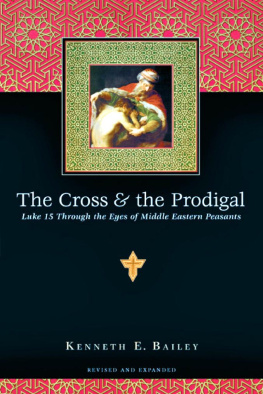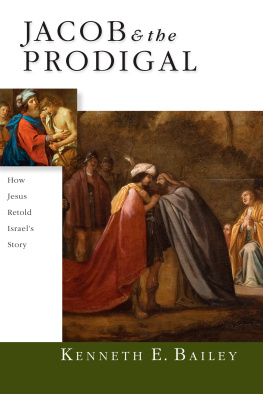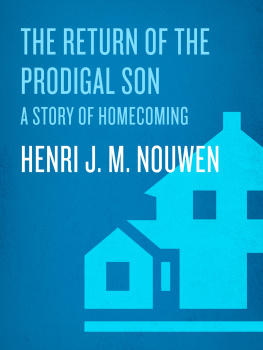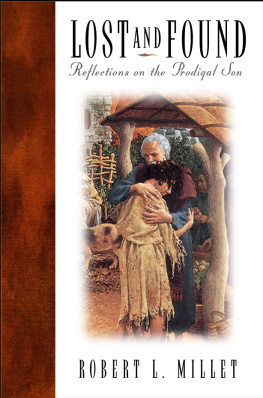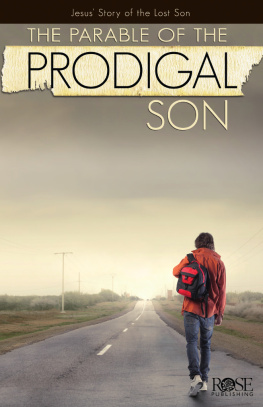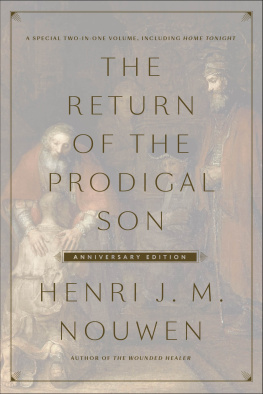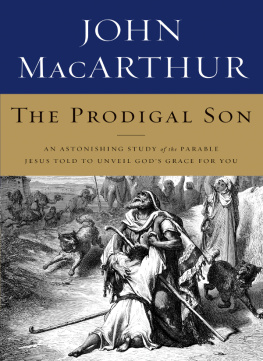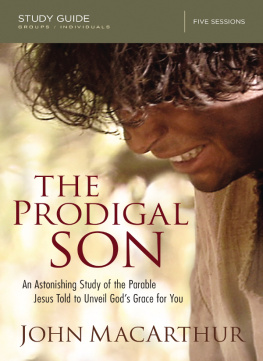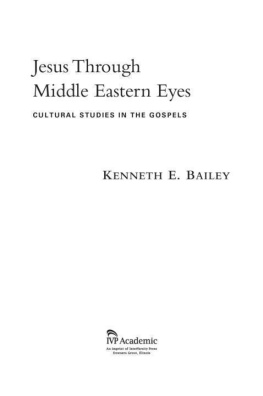"Dr. Kenneth Bailey's unique perspective as one who has spent the better part of his life living in the Middle East unlocks the parables and teachings of our Lord Jesus in remarkably fresh ways. In the unfolding of the prodigal son Bailey demonstrates there is no forgiveness without great cost on the part of the forgiver. This revised edition is a wonderful update and expansion of an already excellent book. I am delighted to commend it."
THE RIGHT REV. JOHN W. HOWE, D.D., BISHOP, EPISCOPAL CHURCH DIOCESE OF CENTRAL FLORIDA
"The Cross & the Prodigal is a little book that changed the minds of Gospel scholars throughout the world. In its original edition (1973) Bailey not only established himself as a leading New Testament interpreter, but he launched an approach to the Gospels that was utterly unique. Over sixty years of life in the Middle East (from Egypt to Iraq) bequeathed to him a discerning knowledge of peasant life; fluency in Arabic; the ability to work in Syriac, Coptic and Aramaic; and an intimate acquaintance with Rabbinic literature. These skills he now applies to the three parables of Luke 15 in order to unlock Middle Eastern New Testament studies-and today Bailey's legacy belongs with scholars such as Joachim Jeremias: leading parable interpreters whose work has been a watershed for the rest of us."
GARY M. BURGE, PH.D., PROFESSOR OF NEW TESTAMENT, WHEATON COLLEGE AND GRADUATE SCHOOL
"This book is for those of us who long to know what Jesus was saying to his audience then, so that we can know what the Bible is saying to us now. Ken Bailey's work is very nourishing, spiritually and theologically. And if you like to be surprised with new insights, you will love The Cross & the Prodigal!"
THE REV. MARIAN MCCLURE, PH.D., DIRECTOR, WORLDWIDE MINISTRIES, PRESBYTERIAN CHURCH (U.S.A.)
"It is an extremely rare event in New Testament studies when the historical expertise of the scholar is combined with the poetic imagination of the storyteller. Ken Bailey's The Cross & the Prodigal unites the professor and the playwright. In the first section of the book the author's unique familiarity with Christian literature of Near Eastern provenance and his intimate knowledge of Near Easter village life produce a fascinating explanation of the parable of the prodigal son, which emerges not as the sentimental account of the pilgrimage of a sorry sinner, but as the portrayal of God as a Father who pays every price possible in the search of two lost sons, a portrait contrary to all expectations associated with a patriarch. The book's second section is a play in four scenes in which this understanding of the parable is placed on the stage. Thus, exegetical theology is transformed back into its original medium, the telling of a story."
ULRICH MAUSER, OTTO A. PIPER PROFESSOR OF BIBLICAL THEOLOGY EMERITUS, PRINCETON THEOLOGICAL SEMINARY
"In The Cross & the Prodigal Kenneth Bailey uses his rare and intimate familiarity with the peasant culture of the Middle East to illuminate three beloved parables: the lost sheep, the lost coin and the lost son. Bailey rightly believes that Christian communities with close connections to the biblical world have many things to teach us about the cultural background of biblical narrative. This classic work, newly revised, provides fresh perspectives for understanding the love of God the Father, and for seeing how the compassion of the cross is present already in the teaching ministry of Jesus Christ."
PHILIP GRAHAM RYKEN, SENIOR MINISTER, TENTH PRESBYTERIAN CHURCH, PHILADELPHIA
KENNETH E. BAILEY





To Ustaz Nageeb Ibraheem in whose heart shines the light which the night cannot overcome, and the light of whose life has guided me through much darkness
........... 9
................... 15
........... 21
........... 23
......... 49
....... 63
.......... 75
............ 91
................. 92
............... 147
............. 148
................. 149
It is almost forty years since I wrote this little book, and it is with joy and much gratitude that I see it reappearing. The editors of InterVarsity Press have invited me to reflect briefly on the journey that the work inaugurated. I count it a privilege to do so.
Andrew Walls, the renowned Scottish historian of non-Western Christianity, has affirmed on numerous occasions that the modern missionary movement launched new academic disciplines. He mentions anthropology and linguistics, along with Asian and African studies. Perhaps there is another discipline that needs to be added to such a distinguished list: Middle Eastern New Testament studies. For many, this proposed field may sound like a contradiction in terms. Isn't the Middle East the heartland of Islam? What does that world have to do with the New Testament? Is there any data for Middle Eastern New Testament studies?
There are more Arabic-speaking Christians in the Middle East than Jews in the entire world. This demographic fact is generally unknown in the West, where all Arabs are often assumed to be Muslims. The result is that even though there were Arabic speakers in the Upper Room on Pentecost (Acts 2:11), millions of Arab Christians today are almost invisible to the Western world. There are at least three plausible reasons for this reality.
Shortly after World War II, Winston Churchill described the critical divide that had occurred between Eastern and Western Europe as an "Iron Curtain." In the early Christian centuries, not one but three curtains fell across the Mediterranean basin separating the Middle East from Europe.

